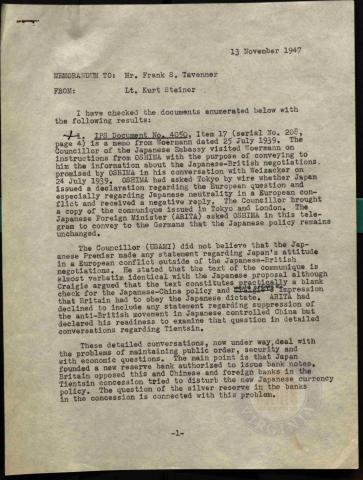
Page 1
| Parent | Examination of Documents Results November 13, 1947 |
|---|---|
| Date | 19 November 1947 |
| Language | English |
| Collection | Tavenner Papers & IMTFE Official Records |
| Box | Box 6 |
| Folder | General Reports and Memoranda from November 1947 |
| Repository | University of Virginia Law Library |
13 November 1947
MEMORANDUM TO: Mr. Frank S. Tavenner FROM:Lt. Kurt Steiner
I have checked the documents enumerated below with the following results:
1. IPS Document No. 4050f Item 17 (serial No. 208, page 4) is a memo from Woermann dated 25 July 1939. The Councillor of the Japanese Embassy visited Woermann on instructions from OSHIMA with the purpose of conveying to him the information about the Japanese-British negotiations, promised by OSHIMA in his conversation with Weizacker on 24 July 1939. OSHIMA had asked Tokyo by wire whether Japan issued a declaration regarding the European question and especially regarding Japanese neutrality in a European con¬flict and received a negative reply. The Councillor brought a copy of the communique issued in Tokyo and London. The Japanese Foreign Minister (ARITA) asked OSHIMA in this tele¬gram to convey to the Germans that the Japanese policy remains unchanged.
The Councillor (USAMI) did not believe that the Jap¬anese Premier made any statement regarding Japan's attitude in a European conflict outside of the Japanese-British negotiations. He stated that the text of the communique is almost verbatim identical with the Japanese proposal although Craigie argued that the text constitutes practicably a blank check for the Japanese-China policy and <insert>would create the</insert> impression
that Britain had to obey the Japanese dictate. ARITA had declined to include any statement regarding suppression of the anti-British movement in Japanese controlled China but declared his readiness to examine that question in detailed conversations regarding Tientsin.
These detailed conversations, now under way, deal with the problems of maintaining public order, security and with economic questions. The main point is that Japan founded a new reserve bank authorized to issue bank notes. Britain opposed this and Chinese and foreign banks in the Tientsin concession tried to disturb the new Japanese currency policy. The question of the silver reserve in the banks in the concession is connected with this problem.
